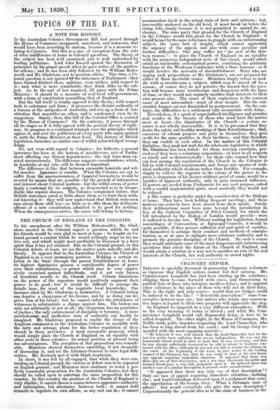TOPICS OP. THE DAY.
A NOTE FOR HISTORY.
IF the Australian Colonies Government Bill had passed through the House of Commons unopposed, unnoticed, and unknown, that would have been according to custom, because it is a measure re- lating to Colonies. But this is a ease of exception from the rule of utter indifference at home to Colonial questions. The theory of the subject has been well examined, and is well understood by leading politicians. Lord John Russell opened the discussion of principles by his grand speech when he gave notice of the particu- lar scheme ; and he has been ably followed by Sir William Moles- worth and Mr. Gladstone, not to mention others. This time, a Co lonial question is not ignored MP the statesmen of Parliament : they have formed distinct ideas, opinions, even wishes, with respect to it ; and, what is more remarkable, they think alike on the sub- ject. As to the sort of law required, all agree with the Prime Minister : it should be a measure of real local self-government, with a form of constitution resembling that of England. IF the Australian Colonies Government Bill had passed through the House of Commons unopposed, unnoticed, and unknown, that would have been according to custom, because it is a measure re- lating to Colonies. But this is a ease of exception from the rule of utter indifference at home to Colonial questions. The theory of the subject has been well examined, and is well understood by leading politicians. Lord John Russell opened the discussion of principles by his grand speech when he gave notice of the particu- lar scheme ; and he has been ably followed by Sir William Moles- worth and Mr. Gladstone, not to mention others. This time, a Co lonial question is not ignored MP the statesmen of Parliament : they have formed distinct ideas, opinions, even wishes, with respect to it ; and, what is more remarkable, they think alike on the sub- ject. As to the sort of law required, all agree with the Prime Minister : it should be a measure of real local self-government, with a form of constitution resembling that of England. But the bill itself is totally opposed to this theory, with respect both to substance and form : it preserves the distant authority of a bureau at the antipodes of Australia, and sets up a form of con- stitution that resembles no other, and is condemned even by its supporters. Surely, then, this bill of the Colonial Office is scouted by the House of Commons ? On the contrary, it passes through all its stages as if it fully agreed with the general theory of right: nay, its progress is a continued triumph over the principles which oppose it, and over the politicians of every party who argue against it, with the Prime Mimster at their head. The history of British legislation furnishes no similar case of wilful acknowledged wrong- doing.
No, not even with regard to Colonies : for hitherto, a general ignorance has been at the bottom of mischievous acts of Parlia- ment affecting our distant dependencies ; the bad laws were en- acted unconsciously. The difference suggests considerations, which, in Australia at any rate, will be deemed important.
The difference is like that between excusable homicide and wil- ful murder. Ignorance is curable. 'What the Colonies are apt to suffer from the uneonsciousness of Imperial lawmakers, would be averted by means that are possible—by the growth of information and interest about Colonial matters : but the wilful errors of power imply a contempt for its subjects, so deep-rooted as to be irreme- diable like organic disease. The Colonies complained before, that British statesmen cared so little about them as to hurt them with- out knowing it : they will now understand that British statesmen care about them still less—so little as to offer them the deliberate affront of a new constitution admitted to be good for nothing. When the consequences arrive, the cause will belong to history.


























 Previous page
Previous page